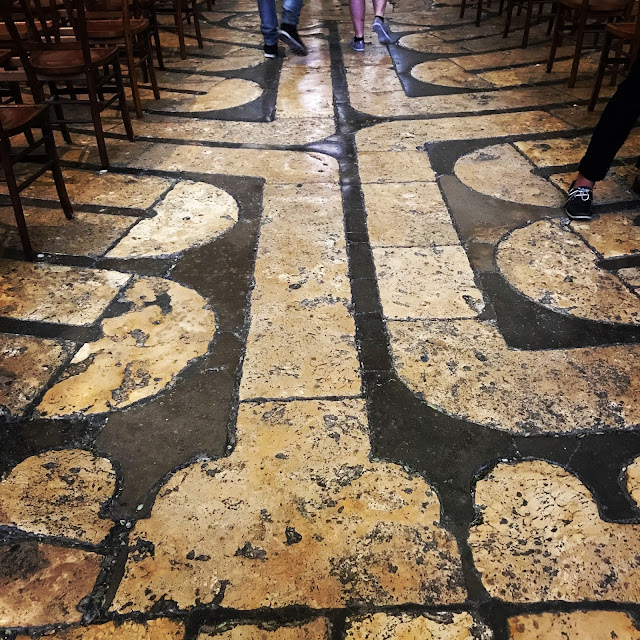Deciding about Love
The time and place, the context, for our Gospel story today from Matthew is in The Temple in Jerusalem on the Tuesday of Holy Week. Jesus is nearing the end of his life. He is visiting the Temple for the last time - soon after this he will walk out of it forever.
We’ve been hearing them these last weeks, the workers in the vineyard, the wedding banquet,
even the question about taxes, which is an overtly attempted play for Jesus to upset either the Jewish nationalists (who resented the particular tax they are talking about which was associated with oppression by the Romans) or the Romans themselves (who would then arrest him if he said not to pay the Roman tax).
So today the Pharisees, perhaps thinking that they will be able to get one up on the Saducees,
that rival party of theirs who failed in their own attempts to best Jesus, perhaps thinking that they can “own” their enemies, put their best man out in front to ask Jesus a serious question: which of the laws is the greatest?
I’m sure as that lawyer asked Jesus the question the others were smirking at each other behind him,
raising eyebrows and nodding knowingly.
Because there are 613 laws. Six hundred and thirteen. Many many laws. Surely Jesus will stumble over this one, will get enmeshed in some of the minutia or offend someone by favoring one law over others when everybody knew that all the laws are equally equal.
They can then hold it against him, tell everyone what he said, that he dismissed 612 of the 613 laws in favor of (can you believe it?) THIS ONE (whichever one it is) and what a blasphemer he is for daring to rank divine commandments when he’s just a carpenter’s son or how dismissive he is of this faction or that group that is listening to these debates.
He’s bound to offend somebody and they are here for it and are going to make the most of it because they cannot abide him. Why? Because he says their focus on little details misses the big picture. He says their empty rituals are frustrating to God. He says they are more interested in religion than in justice.
But Jesus doesn’t hesitate to answer the question. He said, there are two laws, two commandments, inextricably linked and they are to love God with all that you have - your heart, your mind, your soul, and to love your neighbor as yourself. And then he says, on these two commandments hang all the law and the prophets.
In other words, he doesn’t just answer the question but he declares that it is through the lens of this love - loving God and loving neighbor - that we are to see all the laws.
All the commandment. All the stories. All the scriptures.
What is most important is that it is all about love, Jesus says. That’s the key to everything in the whole kingdom of heaven, as Matthew usually puts it, the economy of God, as I like to say.
Our presiding Bishop Michael Curry likes to say it this way: If it’s not about Love it’s not about God. The way of Jesus is the Way of Love.
The difficulty lies in the fact that this means that every day we have to discern how to be loving. Every time we are faced with a decision, a question, every time we need to decide on an action, we have to wonder how we will be loving in our decision, our answer, our course of action, our response to whatever is being presented to us today.
That can be confusing and frankly exhausting.
It’s no wonder that many people prefer to have answers handed to them. Do this or don’t do that.
Haven’t we all looked for universal truths and said, this is great, I can apply this truth to every situation and it will work because it’s a universal truth! Don’t we all know people who can spout a proverb or a line of scripture as the short answer to a complicated question and let that be that? Yes, we all know folks like that and maybe those folks, like Pogo said about enemies, are us.
In his encounter with the Pharisees in the Temple on that Tuesday of Holy Week, Jesus does offer a universal truth, that God is love and the ways of God are about love and as God’s beloved we too must be about love.
This is harder than just applying a proverb. For Jesus, love is not a feeling but how we behave toward one another. And neighbors are not just the people next door but even our enemies. The details of how we live out that love will have to be discerned daily, but love is the guide always.
For Jesus, we can’t love God without loving neighbor - if we’re not loving neighbor we’re not loving God. So if in our deliberations we recognize that what we want to say or do is in fact not loving toward God and neighbor, then we change course. We think again.
And if we have gone and done it and then recognized our error, we repent and try again tomorrow.
These are tense times in our highly polarized nation in the season of a national election. The outrage machine is pumping out vitriol every day, setting traps, wanting to own somebody, ready to spin anything anyone says, ready to dispute and distort, all the while smirking and jostling each other in the background because it is us that they are attempting to snare.
So let love be your guide. Let love be the way. Love God and love neighbor, every neighbor, every day that you can.

Comments